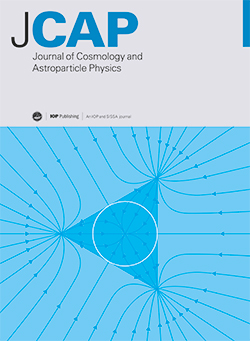Cosmic inflation in analytic infinite derivative scalar-tensor theories
IF 5.9
2区 物理与天体物理
Q1 ASTRONOMY & ASTROPHYSICS
Journal of Cosmology and Astroparticle Physics
Pub Date : 2025-07-24
DOI:10.1088/1475-7516/2025/07/081
引用次数: 0
Abstract
String field theory motivated infinite-derivative models lead to non-local gravity modifications which form a promising class of quantum gravity candidates. In this paper we investigate effects of non-locality on the three-point function (the bi-spectrum) during cosmic inflation. The study is done in an Einstein frame with an infinite-derivative scalar field Lagrangian minimally coupled to the Einstein-Hilbert term. A non-local generalization of the Mukhanov-Sasaki equation is derived. Infinite-derivative operators present in this equation lead to an appearance of infinitely many new background induced states in the perturbation spectrum during inflation with complex masses on top of a usual nearly massless inflaton. On contrary to a flat background such states can be classically stable in a de Sitter space-time. We demonstrate explicitly that observational constraints on the scalar and tensor power-spectra are preserved. We proceed by studying a particular configuration assuming that the generalized Mukhanov-Sasaki equation gives rise to an inflaton and one pair of new states with complex conjugate masses as perturbative degrees of freedom. The corresponding scalar bi-spectrum is computed numerically in squeezed and equilateral limits. We use the latest observational constraints on amplitude of the bi-spectrum fNL from Planck 2018 dataset as a guideline for possible values of masses of new emerging states. We find that fNL is non-trivially sensitive to the values of complex masses and this can reduce the parameter space of gravity modifications. In particular we find that the amplitude of the squeezed limit gets easily enhanced while of the equilateral limit can stay like in a local single-field model of inflation. We end up discussing open questions relevant for this class of models of inflation.解析无穷导数标量张量理论中的宇宙膨胀
弦场理论驱动的无限导数模型导致非局部引力修正,形成了一类有前途的量子引力候选者。本文研究了宇宙膨胀过程中非定域性对三点函数(双谱)的影响。该研究是在爱因斯坦坐标系中完成的,该坐标系具有无限导数标量场拉格朗日最小耦合到爱因斯坦-希尔伯特项。导出了Mukhanov-Sasaki方程的非局部推广。该方程中存在的无穷导数算子导致在具有复杂质量的暴胀过程中,在通常的几乎无质量暴胀的基础上,摄动谱中出现无穷多个新的背景诱导态。与平坦背景相反,这些状态在德西特时空中可以是经典稳定的。我们明确地证明了对标量和张量功率谱的观测约束是保留的。假设广义Mukhanov-Sasaki方程产生一个膨胀子和一对具有复共轭质量的新态作为摄动自由度,我们继续研究一个特殊的构形。在压缩极限和等边极限下对相应的标量双谱进行了数值计算。我们使用来自普朗克2018数据集的双谱fNL振幅的最新观测约束作为新出现状态质量可能值的指导。我们发现fNL对复杂质量值具有非平凡的敏感性,这可以减小重力修正的参数空间。特别地,我们发现在局部单场膨胀模型中,压缩极限的振幅容易增强,而等边极限的振幅可以保持不变。最后,我们将讨论与这类通货膨胀模型相关的开放性问题。
本文章由计算机程序翻译,如有差异,请以英文原文为准。
求助全文
约1分钟内获得全文
求助全文
来源期刊

Journal of Cosmology and Astroparticle Physics
地学天文-天文与天体物理
CiteScore
10.20
自引率
23.40%
发文量
632
审稿时长
1 months
期刊介绍:
Journal of Cosmology and Astroparticle Physics (JCAP) encompasses theoretical, observational and experimental areas as well as computation and simulation. The journal covers the latest developments in the theory of all fundamental interactions and their cosmological implications (e.g. M-theory and cosmology, brane cosmology). JCAP''s coverage also includes topics such as formation, dynamics and clustering of galaxies, pre-galactic star formation, x-ray astronomy, radio astronomy, gravitational lensing, active galactic nuclei, intergalactic and interstellar matter.
 求助内容:
求助内容: 应助结果提醒方式:
应助结果提醒方式:


